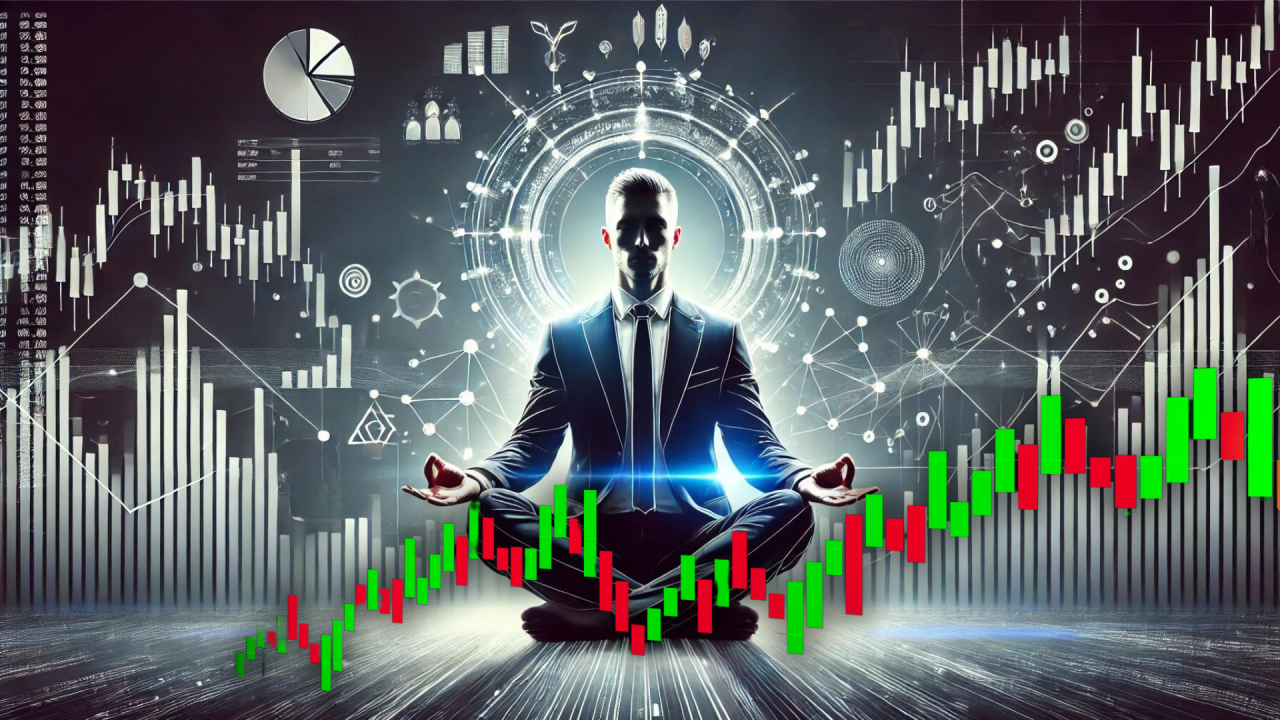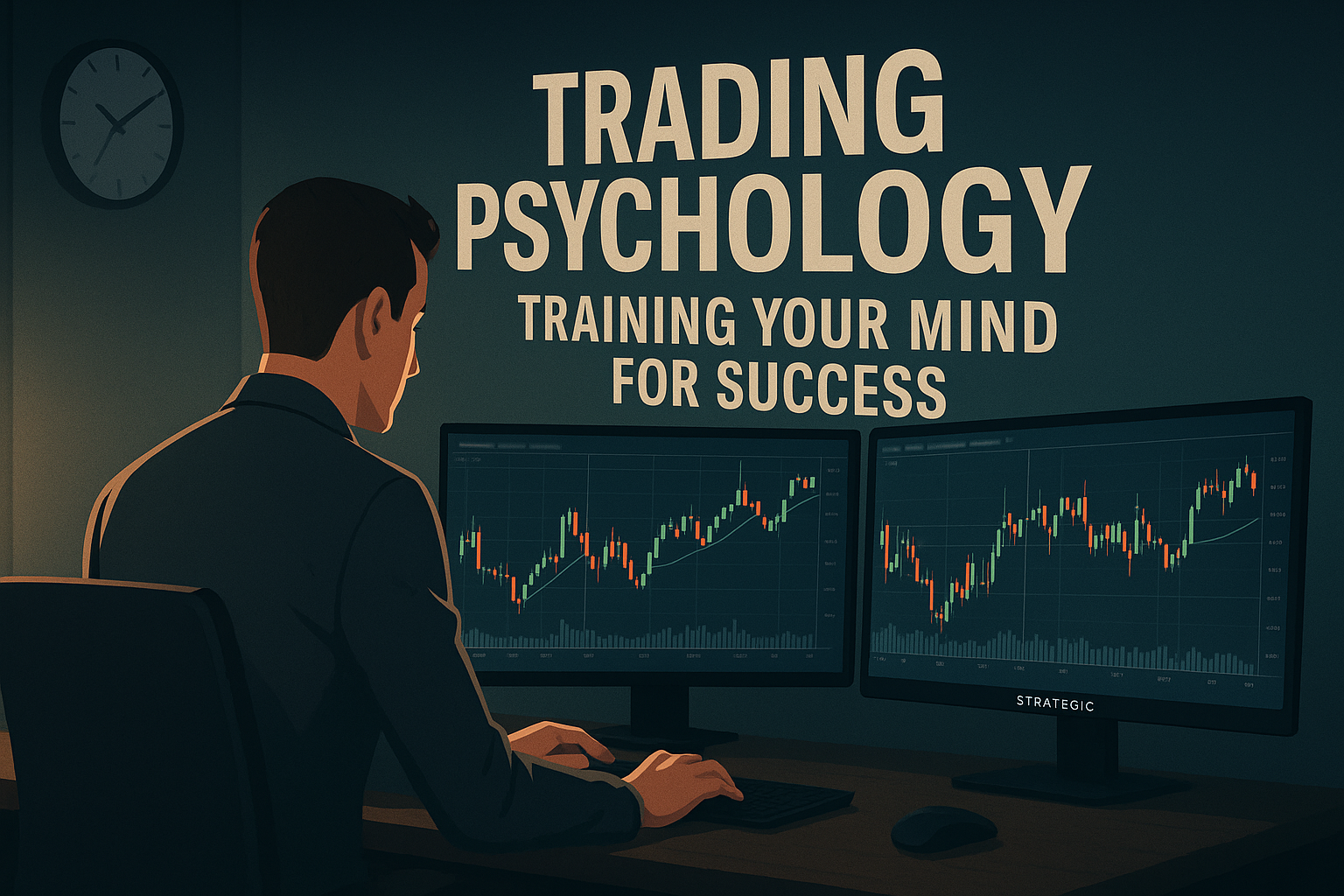The Psychology of trading is not just about using charts or following strategies—it’s also about how you think and feel while making decisions. Many traders lose money not because their plan is wrong, but because their emotions get in the way.
Feelings like fear, greed, or stress can lead to poor choices, such as entering trades too quickly, holding too long, or closing too early.
That’s why understanding the psychology of trading is so important. When your mind is calm and focused, you make better decisions and stick to your plan. In this article, we’ll explain why your mindset matters in trading and how you can build better habits to become a more confident and successful trader.
Mastering the Mind: Why Psychology Is the Key to Trading Success at STRATEGIC

In trading, having good strategies and tools is important—but your mindset is even more powerful.
At STRATEGIC, we believe that psychology is not just something that supports trading. It’s the main part of becoming a successful trader. In this article, we’ll explain why mindset matters more than strategy and how STRATEGIC helps students build strong mental habits for long-term success.
Why Psychology Is More Important Than Strategy
Most traders start by learning charts, indicators, and systems. But after some time, they notice their emotions are causing more losses than bad setups.
Feelings like fear, greed, doubt, and overconfidence often lead to mistakes. At STRATEGIC, we’ve seen that many traders don’t fail because their plan was wrong—they fail because they couldn’t control their emotions.
Common Emotional Mistakes in Trading (Simple Explanation)
In trading, your biggest challenge is not always the market—it’s often your own feelings. Even if you have a good plan, emotions like fear or greed can lead to bad decisions. At STRATEGIC, we teach traders how to avoid these common emotional mistakes that can hurt your results.
Let’s take a closer look at each one:
1. Overtrading
This means trading too much without a clear reason. Some traders get bored or feel the need to “do something” all the time. But more trades don’t always mean more profit. In fact, overtrading usually causes more losses. It’s better to wait for a strong setup than to trade just for the sake of it.
2. Revenge Trading
After losing a trade, some people quickly try to win the money back. This is called revenge trading. It’s driven by emotion, not a proper plan. This usually leads to more bad trades and bigger losses. The smart move? Take a break, breathe, and come back when your mind is calm.
3. FOMO (Fear of Missing Out)
You see a trade moving fast and worry you’re missing the chance. So you jump in too late. This is called FOMO. But most of the time, by the time you enter, the best part of the trade is already gone. It’s better to miss a trade than to make a bad one just because you felt rushed.
4. Fear of Entering a Trade
Sometimes, even when everything looks good, you feel scared to click “buy” or “sell.” You might worry about losing money or being wrong. This fear can stop you from following your plan. That’s why at STRATEGIC, we teach you to follow a checklist and trust your plan, so you don’t hesitate.
5. Overconfidence After Winning
Winning a few trades can make you feel too confident. You might start taking bigger risks, ignoring your rules, or trading without thinking clearly. This is dangerous. A good trader stays calm and careful—no matter how many wins they’ve had.
STRATEGIC’s Way of Building Mental Strength
At STRATEGIC, we teach traders to control their emotions from the very beginning.
In the first week, students start keeping a trading journal. This isn’t just for writing down trades—it’s for writing about their feelings before and after each trade.
Each student also gets a mental checklist to review daily. Every week, our mentors look at performance and mindset together—not just the numbers, but how each trader is thinking.
During our bootcamp phase, we do live trading exercises that create real pressure. This helps students stay calm and confident in fast-moving markets.
The Power of Journaling

We believe journaling is one of the most important tools in trading. And at STRATEGIC, we make it a must for every student.
But this journal is not just about entries and exits—it’s about emotions. We ask:
-
How did you feel before the trade?
-
Did you stick to your plan?
-
What made you close the trade early or late?
Writing this down every day helps students understand their own behavior. Over time, this builds better habits and stronger decision-making.
How We Train the Mind at STRATEGIC (Easy and Clear)
At STRATEGIC, we know that staying calm and focused is just as important as having a good trading plan. That’s why we help our students train their mind, not just their skills. We use simple but powerful methods to keep emotions in control and build strong habits.
Here’s how we do it:
1. Positive Affirmations (Self-Motivation)
We ask our students to start their day by saying positive things to themselves.
For example:
“I trust my plan.”
“I stay calm when trading.”
“I learn from every trade.”
These short, positive lines help build confidence and set the right mindset before trading begins.
2. Breathing Exercises (To Stay Calm)
Before placing a trade, many people feel nervous or unsure. That’s normal!
We teach students to take slow, deep breaths before making decisions.
This helps them relax and stay in control, instead of acting out of stress or fear.
3. Stress Practice (Live Training Under Pressure)
Real markets can move very fast, and that can create pressure.
At STRATEGIC, we give students practice in fast and stressful trading situations.
This helps them learn how to stay calm and follow their plan—even when things get tough.
It builds mental strength and confidence for real-world trading.
4. Guided Reviews (Learn from Mistakes Without Stress)
Everyone makes mistakes while learning. That’s okay!
We help our students review their trades in a simple, stress-free way.
With a mentor, they look at what happened, what they felt, and how they can improve next time—without feeling bad or blaming themselves.
This helps them grow and make better choices in the future.
5. Peer Talks (Support from Other Traders)
It helps to know you’re not alone.
That’s why we encourage students to talk with other traders in a group.
They can share how they feel, talk about their wins or losses, and get support.
Talking to others builds trust, confidence, and emotional balance.
Real Story: Usama’s Mindset Transformation
One of our students, Usama, had great technical skills—but struggled with revenge trading. After a losing trade, he would try to win back the money too quickly and lose more.
Through journaling, mentor sessions, and mindset coaching, he learned to stop, reflect, and trade again only when clear. After 3 months of consistent effort, his performance improved, and today, he’s part of our internal trading team.
His story shows that changing your mindset can change your future.
The Hidden Problem: Cognitive Biases
Cognitive biases are small mental tricks your brain plays on you. They affect your decisions without you noticing.
At STRATEGIC, we help traders become aware of these traps. For example:
-
Confirmation Bias – You only see what supports your opinion, and ignore the rest.
-
Recency Bias – You think recent results (wins or losses) will always continue.
We teach traders to reflect honestly and use facts and data, not just emotions.
Handling Market Volatility with a Strong Mind
The market can be wild. Prices move fast, and emotions can take over.
At STRATEGIC, we prepare our students with real-life training in volatile situations. This way, they practice staying calm during high pressure—without risking real money.
We also teach students to use clear exit plans, take deep breaths, and pause before making emotional trades. These small habits make a big difference when the market is moving fast.
How We Build Long-Term Mental Strength
Mental toughness doesn’t come in a day. At STRATEGIC, we focus on slow and steady progress.
We use:
-
Weekly reflections
-
Long-term tracking of progress
-
Mindset coaching based on stoic thinking
One powerful stoic idea we teach is: “Prepare for the worst, control what you can.”
This helps traders feel less fear and more patience—two important traits for success.
Mindset and Money Management: They Work Together
If you don’t have the right mindset, even a perfect money plan won’t help.
-
Greed can make you risk too much.
-
Fear can stop you from using your capital wisely.
At STRATEGIC, we show students how to handle different account sizes. Trading $1,000 feels very different than $100,000—and both need mental training.
FAQs: Trading Psychology at STRATEGIC
Q1: Why does STRATEGIC focus on psychology?
Because most mistakes are caused by emotion, not strategy. We help you understand and control your thoughts.
Q2: Can emotional people become good traders?
Yes! With the right training, anyone can improve their mindset and become more disciplined.
Q3: What tools do you use for mindset training?
Journals, checklists, mentor reviews, live practice, and group support.
Q4: How long does it take to develop strong psychology?
Most traders see big improvements in 6–12 weeks with regular practice.
Q5: Do you offer support after training ends?
Yes. You’ll have access to mindset webinars, support groups, and mentors even after the course.
Conclusion: Mindset First, Strategy Second
Trading isn’t about being perfect. It’s about being mentally strong, emotionally calm, and disciplined every day.
At STRATEGIC, we don’t just teach you how to trade—we train your mind to lead. Because in the long run, it’s not the strategy that wins…
It’s the mindset.
Ready to train your mind like a pro?
**Join STRATEGIC today and start building the most important trading skill—**your mindset.
want to read more articel visit our website
Big Shoutout to the guys who made this blog happen UDM.




